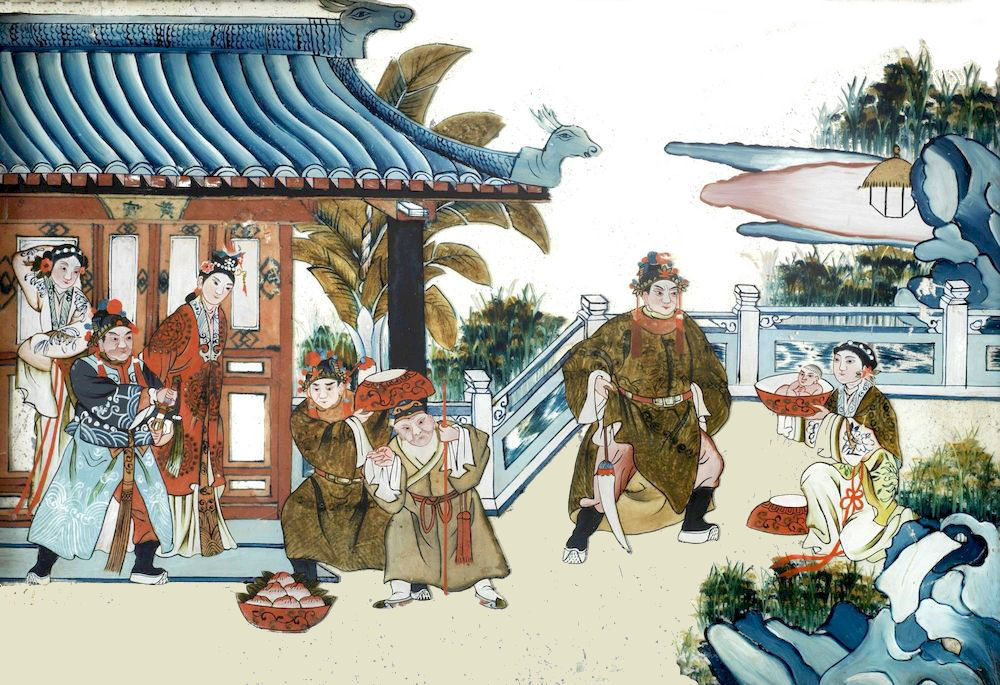Swapping the Prince for a Leopard
(Límāo Huàn Tàizǐ 狸猫换太子)
Dramatis Personae
Concubine LǏ 李 = mother of a newborn prince
Concubine LIÚ 刘 = slightly later mother, whose son abruptly died
GUŌ Huái 郭槐 = an evil eunuch
KÒU Zhū 寇珠 = a palace lady
CHÉN Lín 陈琳 = a virtuous eunuch
King Bāxián 八贤 = the imperial younger brother
QÍN Fèng 秦凤 = a prison warden
BĀO Zhěng 包拯 = China’s most famous detective
An emperor of the Sòng 宋 dynasty (period 15) had two concubines, one named LIÚ 刘 and one named LǏ 李. He had no heirs, and to his joy both concubines became pregnant at about the same time. He decreed that the first to bear a son would become empress.
Concubine Lǐ had in fact become pregnant a few days earlier than Concubine Liú, who was very ambitious and wished to become empress herself. Concubine Liú pretended to great solicitousness for Concubine Lǐ, and proposed to help her with the birth. Concubine Liǔ meanwhile conspired when the Evil Eunuch GUŌ Huái 郭槐.
When the baby arrived, Concubine Liú deftly substituted a newly skinned newborn leopard that Evil Eunuch Guō had procured for her, and she announced to the world that Concubine Lǐ had given birth to a monster. The real baby she passed to Palace Lady KÒU Zhū 寇珠, with orders to carry it in a basket to the river and drown it. Meanwhile Concubine Lǐ, as punishment for bearing the monster, was sent into house arrest at the Cold Palace, a place designated for discarded concubines.
Palace Lady Kòu was despondent at the prospect of killing the child, and was discovered by Virtuous Eunuch CHÉN Lín 陈琳, on his way to present a gift to the emperor’s younger brother, king Bāxián 八贤.
Virtuous Eunuch Chén, concerned because the fate of the empire lay with the fate of the emperor, had no desire to see the heir to the throne killed, but knew that he could not be raised openly. So he concealed the baby in his gift basket, and transmitted it to the imperial younger brother Bāxián, who agreed to raise the wee prince as his own child.

Right: “Palace Lady Kòu was despondent at the prospect of killing the child, and was discovered by Virtuous Eunuch CHÉN Lín.”
Left:“CHÉN Lín concealed the baby in his gift basket, and transmitted it to the imperial younger brother, who raised the wee prince as his own child.”
(Reverse Glass Painting from the Mei Lin Collection [Rupprecht Mayer and Haitang Mayer-Liem])"
Shortly after this, Concubine Liú’s own son was born, and amid the great rejoicing, she was declared Empress. But unfortunately the baby sickened and died. The Emperor, interested principally in Daoist elixirs of immorality, produced no more children, and at length adopted his brother’s child as the crown prince, unaware that the child really was the crown prince, the son of the exiled Concubine Lǐ.
One day Lady Kòu, who was charged to look after the little boy, took him to the Cold Palace, where he chanced to see his mother, whom he much pitied. Later he asked the Empress about the lady in the cold palace.
Concubine Liú (now Empress Liú) became suspicious that perhaps the boy might actually be the son of Concubine Lǐ, to whom he in fact had a remarkable resemblance. She accused Palace Lady Kòu of deceiving her. When Lady Kòu denied it, she sent for Virtuous Eunuch Chén to come and beat her until she confessed. To avoid involving Chén, Lady Kòu hanged herself.
Chén rushed to the Cold Palace and arranged the escape of Concubine Lǐ, who went dressed in his clothes, with the assistance of Cold Palace Warden QÍN Fèng 秦凤, who set fire to the Cold Palace so as to conceal her escape. Fearing that the empress would later investigate and not find a body, Qín Fèng himself rushed into the inferno so that a charred body would be found.
In view of the possible escape of Concubine Lǐ, the empress had issued a warrant for her arrest, but all that was found was the discarded clothing she had warn to slip out of the palace. Unfortunately, someone recognized it as belonging to Virtuous Eunuch Chén, whom the empress ordered arrested and poisoned.
The Imperial Younger Brother Bāxián could stand the situation no longer, and reported it secretly to the emperor, who was appalled, but fearful of the ever more ruthless empress. The emperor was about to take action, when he was stricken with a mysterious illness and died, leaving Lady Liú’s adopted son (Lady Lǐ’s real son) as the head of state, with the Empress as regent.
Fifteen years later the boy officially took command of the nation. Concubine Lǐ, who was living in a small village under an assumed name and had gone blind from weeping, joined others to attend festivities in celebration of his ascension, and was able to kneel before the passing procession.
Magistrate BĀO Zhěng 包拯, known to history as Magistrate Bāo (BĀO gōng 包公, 1062d) China’s most famous detective, happened to be passing by as part of the procession, and he agreed to hear her complaint in private. In the end he collected enough evidence to accuse the empress and Evil Eunuch Guō Huái before the eyes and ears of the new emperor.
The evil empress and eunuch were severely punished; Concubine Lǐ was made empress-mother. And the virtuous dead —Palace Lady Kòu, Virtuous Eunuch Chén, and Palace Warden Qín— are commemorated forever in the memories of the ordinary people, as is Magistrate Bāo.
